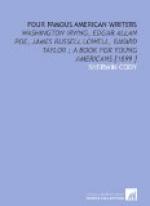One of his friends said of him at this time that he was “self-willed, capricious, inclined to be imperious, and though of generous impulses, not steadily kind, nor even amiable.” Part of this temper on his part may have come from the fact that the aristocratic boys of the school hinted that his father and mother had not been of the best people. They knew, however, that Mr. Allan belonged to the best society; and it was chiefly Edgar’s imperious manners that made some of them shun him. He had friends, however, and Mr. Allan gave him money liberally.
It was at this time that he found and lost his first sympathetic friend.
This was Mrs. Jane Stith Stanard, the mother of one of his younger schoolmates. When one day he went home with this friend, he met Mrs. Stanard, a lovely, gentle, and gracious woman, was thrilled by the tenderness of her tones and her sympathetic manner toward him, and immediately made her his boyhood friend and confidante. To his great grief, however, she died not very long afterward. When she was gone he visited her grave time after time, and in after years when he was unhappy he often thought and spoke of her.
CHAPTER IV
COLLEGE LIFE
Poe left the English and Classical School in March, 1825, and spent the next few months in studying with a private tutor.
On the 14th of February, 1826, he wrote his name and the place and date of his birth, in the matriculation book of the University of Virginia, the famous college founded by Jefferson and opened about a year before.
Poe is described at this time as short, thickset, bowlegged, with the rapid and jerky gait of an English boy. His face, surrounded by dark curly hair, wore a grave, half-melancholy look; but it would light up expressively when he talked. He was a noted walker; and being the adopted child of a rich man, he dressed well and carried himself proudly. He studied Latin, Greek, French, Spanish, and Italian, and stood well in his classes. At the end of the year he went home with the highest honors in Latin and French.
Before the term closed, however, Mr. Allan went up to investigate some stories of Poe’s wildness that had reached him, and found that besides other debts, Poe owed two thousand dollars in “debts of honor”—that is, gambling debts. Mr. Allan paid all but the latter, and quietly determined that as soon as the term closed, Poe’s college life should end.
Poe was, however, a studious and well-behaved young man in the opinion of the professors, and he was never found guilty of any serious misconduct. He was fond of wandering over the Ragged Mountains, whither he went alone or with only a dog, and he delighted to fancy that he was the very first white person to penetrate some lonely glen or ravine.
He was also something of an artist, and decorated his rooms with charcoal sketches. He and a classmate bought a volume of Byron with steel engravings in it. The next time his friend went to see Poe he found him copying one of these on the ceiling, and he continued this until he had covered the whole of the walls with figures that were said to be artistic and striking.




